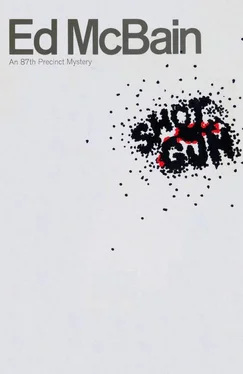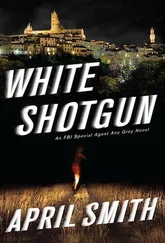The back of Feldman’s shop was a monument to disorder. Cartons were heaped haphazardly upon other cartons, hockey sticks were stacked in corners, ice skates and boxing gloves hung from nails and pegs, skis and poles leaned dangerously against the walls, fishing poles wobbled overhead on wooden slats, boxes of ping-pong balls and jackknives teetered menacingly, dust covered everything.
“Oh boy, what a mess,” Feldman said. “Every time I come back here, I get an ulcer. August, you said?”
“Or anytime since.”
“Oh boy,” Feldman said. “August, August, where the hell is August?”
He blew dust off a box of fishing flies, put it back on a shelf that contained athletic supporters, reached for another box, blew dust from it, shook his head, said, “No, that’s July,” and picked up yet another box. “What the hell is this?” he asked of no one, nodded, said, “BB pellets,” put the box back on the shelf alongside a box of hockey pucks, lifted another large box, and said, “September. You want to start with September?”
“Why not?” Carella said.
“Where the hell am I going to put this?” Feldman said, looking around. He found a large carton containing baseball bats, rested the box on it, and lifted the lid. The box was crammed full of sales slips, thirty or forty of which fell to the dusty floor when he raised the lid.
“There must be ten thousand slips in this box alone,” Feldman said.
“Well, not that many,” Carella said, and smiled.
“All right, five thousand, who’s counting?”
“Do you record serial numbers when you sell a gun?” Kling asked.
“Every time,” Feldman said. “That’s the law in this state.”
“For pistols, it is,” Carella said. “How about shotguns?”
“No, I don’t record no serial numbers on shotguns.” Feldman looked worried again. “I’m not required to do that, am I?”
“No, but—”
“No, I don’t do that,” Feldman said. “Why? You got a serial number?”
“Yes.”
“It won’t do you no good here,” Feldman said, and shook his head.
“How about the model number? Would you write that on your invoice?”
“Sure I write the model number. Besides, I won’t sell any kind of a gun to somebody I don’t know. Unless he gives me his name and address.”
Carella nodded. Kling gave Feldman the manufacturer’s name and the model number of the shotgun — 833K — and the three men began wading through the sales slips. There were exactly 527 slips in the box; Kling counted them. Not one of them recorded a sale for a model 833K shotgun.
“So it must have been August,” Carella said.
“Just our luck,” Feldman said. He was a determined little man, and he seemed to have entered into the spirit of the chase now, anxious to find the sales slip, anxious to be of assistance in bringing a murderer to justice. Busily, he searched the crowded, dusty backroom for the missing box of August sales slips. At last, he found it buried under six boxes of tennis balls on the bottom shelf against the far wall.
Kling began counting again as they went through the August slips. They reached 212 when Feldman said, “Here we go.”
They looked at the slip.
“See?” Feldman said. “There’s his name and address. I take everybody’s name and address when I don’t know who it is I’m selling a gun to. You never know when some nut is going to shoot the President, am I right?”
The name on the sales slip was Walter Damascus. The address listed was 234 South Second Street. The price of the gun was $74.95, plus the 5 percent sales tax, and the 2 percent city sales tax.
“Would you have sold more than one of these models?” Kling said.
“In August, you mean?”
“Yes.”
“No, how could I? I only got one in the shipment.”
“Then this is the man who bought it,” Carella said.
“Sure, it must be.”
“Sounds like a phony name,” Kling said. “Damascus.”
“Did you ask him for identification, Mr. Feldman?” Carella asked.
“Well, no, I didn’t.”
“Why not?”
“I never do.”
“When you sell a stranger a gun, you take his name and address—”
“Yes.”
“... but you don’t ask for identification?”
“No.”
“Well, what good is that?” Carella asked.
“I never thought of it,” Feldman said, and shrugged. “I’m not required to ask them for anything, you know. You can buy a rifle or a shotgun anywhere you want to in this state without a license, without nothing. I just ask them their name and address as a precaution, you understand me? Just in case some nut is buying the gun, you know what I mean?”
“Yes, we know what you mean,” Carella said.
234 South 2nd Street was a corner building, a red-brick tenement that at one time must have been very posh. Gargoyles still leered into the street from each floor, and even the entrance doorway was decorated with a sculpted keystone, a woman’s head with the nose gone and the word SUCK painted in blue across her mouth. Two men were standing on the front stoop when Carella and Kling entered the building. Instantly smelling fuzz, they watched as the two cops studied the mailboxes in the foyer. Neither of them said a word.
The mailboxes listed a W. Damascus for apartment 31.
There were slum smells on the stairwell, slum sounds in the halls and behind closed doors and in the airshaft between the building and the one adjacent. There was a sense of life contained and concealed, a teeming, tumultuous life breeding in the cracks of poverty, eating and mating and sleeping and excreting, an animalistic substructure dwelling in a multilayered cave that stank of piss and frying fat. On the second floor, a rat the size of an alley cat stared at Carella and Kling with eyes that glittered in the refracted airshaft light pouring through the stairwell window. Carella, who had already drawn his revolver, almost fired in reflex. Boldly, the rat held his ground and continued to stare at them. They sidled past him, close to the banister, and the rat’s head turned, nose twitching, alert, watching. Carella was sweating when they reached the third floor.
Apartment 31 was in the middle of the hallway, next to 32, and facing 33. Kling listened at the door, shook his head, and then backed off against the opposite wall. Carella moved to the side of the door, revolver in hand, finger inside the trigger guard. Kling raised his knee, shoved himself off the opposite wall, and piston-kicked the flat of his foot against the door, as high as he could, as close to the lock and the jamb as he could. The lock sprang, the door swung inward on its hinges. Kling followed the door into the room, and Carella peeled off like the wingman in a fighter squadron, crouching low, gun in hand, immediately behind Kling.
The room was empty.
They fanned out immediately, going through all the rooms in succession. The bathroom door was closed. Carella slowly turned the knob with his left hand, flipped the door suddenly open, and entered the tiny room gun-first. It, too, was empty.
“You’d better get the super up here,” he said to Kling. “I’ll take a look around.”
The apartment was small and determinedly filthy. The door Kling had kicked in opened on a living room furnished with a three-piece “suite” (one armchair upholstered in gold, another in blue, the sofa in maroon) clustered around a television set in the corner. A picture of a smiling peasant puffing on a pipe, neo-Rembrandt, was hanging over the television set. An open edition of the city’s only morning tabloid lay on the sofa. The date on the paper was September 9. There were empty beer cans and full ashtrays on the floor. In the kitchen, dishes caked with the leftovers of a week’s meals were stacked in the sink, and used breakfast dishes were still on the table. Judging from the dry and moldy cornflakes still clinging to the bottom of the bowl, the last breakfast Damascus had eaten here could easily have been close to two months ago, the date on the living-room newspaper. A September issue of Life was on the bathroom floor, near the toilet bowl. A man’s safety razor was on the sink, and patches of dried, hair-clogged shaving cream clung to the sloping tile sides. Wherever Damascus had gone, he had not bothered to take his razor with him. Two small scraps of toilet tissue were near the cold-water faucet, each with small smears of blood on them. It was reasonable to assume that Damascus had cut himself while shaving, and had used the toilet tissue to blot the blood. A grimy ring circled the bathtub. A sliver of Ivory soap and a swirl of hair were caught in the open drain. Near one claw leg of the old-fashioned tub, a man’s striped undershorts were wadded in a ball. There were cockroaches nesting behind a tube of toothpaste on the sink, and tile lice wiggled on the floor. It was altogether the most charming room in the place.
Читать дальше












